Facebook removes fake accounts tied to Romania that posed as Trump fans
The network of fake accounts posted about the November election, QAnon and other US political topics, Facebook says.

Facebook removes accounts that mislead others about their identity and purpose.
Facebook said Thursday that it removed a network of fake accounts in July tied to Romania, some of which pretended to be Americans and posed as fans of President Donald Trump.
The company removed 35 Facebook accounts, 3 Facebook Pages and 88 Instagram accounts that originated in Romania. Facebook owns Instagram. The people behind the accounts posted about various US political topics, including the "upcoming November election, the Trump campaign and support for the campaign by African Americans, conservative ideology, Christian beliefs, and QAnon," Facebook said in a report. QAnon is a far-right conspiracy theory alleging there's a plot by the "deep state" against Trump and his supporters.
The fake accounts also shared stories by the Trump campaign and conservative news outlets. One Trump fan page, called We Love Our President, shared a video clip from Fox News. Roughly 1,600 accounts followed at least one of the Pages and about 7,200 people followed at least one of the Instagram accounts.
Facebook has continued to pull down networks of fake accounts ahead of the US presidential election in November for misleading others about their identity and purpose. The company focuses on the behavior of the accounts, not the content they post. The use of fake accounts has been a bigger concern after Russian trolls used social networks to post content that attempted to sow discord among Americans during the 2016 US presidential election. Facebook, though, continues to face criticism over how it enforces its rules and whether it's quick enough in pulling down accounts that spread misinformation.
Nathaniel Gleicher, who oversees cybersecurity policy at Facebook, said the company hasn't found clear evidence pointing to why these fake Romania-linked accounts posted about US politics and if it was financially motivated.
Conservatives have accused Facebook of suppressing their speech, allegations the company repeatedly denies. Gleicher said Facebook has seen people use fake accounts to post about both left-wing and right-wing politics. The content they share might not indicate their political beliefs or interests.
"What we see consistently is that these actors are looking for divisive topics and points of tension that will draw attention, help them build audiences and help them push their narrative," Gleicher said. "In doing that, they will use any content they can find that will be effective."
The company has seen bad actors use accounts that were either compromised, such as through a hack, or purchased from others. "This is an ongoing threat. We know that the people behind this kind of malicious activity will continue to try and improve their tactics," he said.
The network of fake accounts tied to Romania was one of nine networks Facebook pulled down in July. One network, which included 303 Facebook accounts, 181 Pages, 44 Groups and 31 Instagram accounts, was tied to various countries, including the US, the UK, Australia, France and Hong Kong. These accounts targeted regions where people primarily spoke Chinese and English. They were linked to digital media outlet Truth Media, which has been banned from Facebook.
In July, Facebook removed a total of 798 Facebook accounts, 259 Instagram accounts, 669 Facebook Pages and 69 Facebook Groups.

